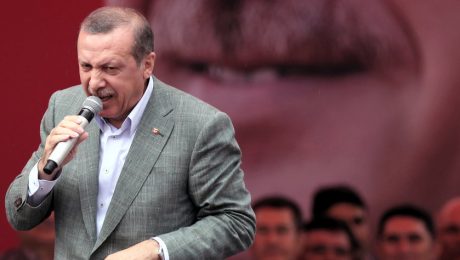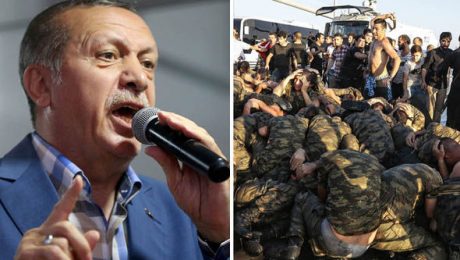Keyword: Terrorism

The Turkish assassin is a product of Tayyip Erdogan’s incitement
Karlov’s murderer was Mevlüt Mert Altintas. He did not grow up in a vacuum. Five years ago, Erdogan acknowledged his goal was “to raise a religious generation.” Altintas is its product. He was seven years old when Erdogan came to power; his whole schooling was under Erdogan. If history is any pattern, the violence in Turkey is just beginning and Erdogan will not be able to contain it, even if he is inclined to try.

Turkish community leader in Hampshire condemns Russian ambassador’s assassination
“We are shocked and deeply saddened to learn of the tragic assassination of Russia’s Ambassador to Turkey, Andrei Karlov, who was speaking at an art gallery in Ankara,” said Eyup Sener, chairman of the Turkish Cultural Center New Hampshire. “We condemn in the strongest terms this heinous act of terror. No terrorist act can be justified, regardless of its perpetrators and their stated purposes.”

Turkey at the precipice
Turkey has a terror problem. The Islamic State, Kurdish extremists and radical leftists each pursue targets inside Turkey seemingly with impunity. Turkey is no stranger to terrorism, but for decades it managed to control the problem. Turkey’s security forces were efficient. Today, however, the situation has changed. Turkish President Erdogan has purged the military, the police, and intelligence professionals.

Fethullah Gülen’s Message of Condolences and Condemnation of the Terrorist Attack in Istanbul
Fethullah Gülen: I condemn, in the strongest terms, the cruel terrorist attack carried out beside the Istanbul Beşiktaş Football Stadium that cost the lives of 44 of Turkish citizens, the majority of whom are members of the security forces.

The Fall of Turkey
Western officials have preferred to raise concerns over the steady dismantling of Turkey’s free institutions only privately with their counterparts in Ankara. This approach has failed. That failure has left many millions of pro-democracy Turks to fend for themselves, while a once-fringe ideological element in the AKP, reared on Islamist supremacism, has been emboldened.

Turkey’s latest bombing will help its president amass more power
Mr Erdogan likes to cast himself as a cure for the chaos spreading across Turkey. Yet he is also one of its causes. Courting the nationalist vote, Mr Erdogan has ruled out peace talks with the PKK. Responding to PKK attacks against security targets in 2015, he inflamed the conflict by arresting Kurdish politicians, pulverising towns in the southeast, and displacing some 500,000 people.

Erdogan’s Private Youth Army
Initially, the youth branches will be formed in 1,500 mosques. But under the plan, 20,000 mosques will have youth branches by 2021, and finally 45,000 mosques will have them. Observers fear the youth branches may turn into Erdogan’s “mosque militia,” like the Nazi Party’s Hitler Youth organization in Germany.

Turkey pays a price for purging counterterror professionals
In the wake of the abortive July 15 coup, he purged thousands of experienced counter-terror police and rotated others out of areas they know best. In effect, this means the Turkish security and police are operating blind. It can take years to gain the experience in any particular locality that those whom Erdogan fired had.

WikiLeaks reveals emails from the son-in-law of President Erdogan, ‘proving his connection to ISIS operation smuggling oil into Turkey’
WikiLeaks has released a tranche of more than 57,000 personal emails from the account of Turkey’s Minister of Oil Berat Albayrak, President Erdogan’s son-in-law. WikiLeaks alleges that the emails reveal ‘Albayrak’s involvement in organisations such as Powertrans, the company implicated in Isis oil imports’. The company has been implicated in oil imports from ISIS-controlled oil fields.

Nigeria: Hizmet Movement not terrorists
The Concerned African Youth against Tyranny (CAYAT) has denied report that the Fethullah Gulen Movement and Hizmet Movement are terrorist groups. National Coordinator of the organisation, Mr. Musa Shaba said yesterday in Abuja that contrary to claims by the Turkish government the movement has become the face of Turkey in Nigeria and Africa.

Only educational efforts of groups such as Hizmet can eradicate extremism
In sharp contrast to Boko Haram, there is a faith-inspired group, a civil society movement that engages in education, dialogue and charitable activities and has grown out of Muslim grass roots. Check out how disturbed Boko Haram is about Hizmet’s education campaign, which offers opportunities for both boys and girls. Check out how ISIL publications outline exactly how they hate the Hizmet movement’s efforts and why they see Hizmet as their “enemies.”

Turkey’s looming prison massacre grows nearer
It appears Erdogan fears that if the judiciary begins trial for key political prisoners, the prisoners would have a venue at which to speak and raise questions Erdogan does not want addressed, especially with regard to the possibility that the events on the evening of July 15 were Turkey’s equivalent of the Reichstag fire.




















